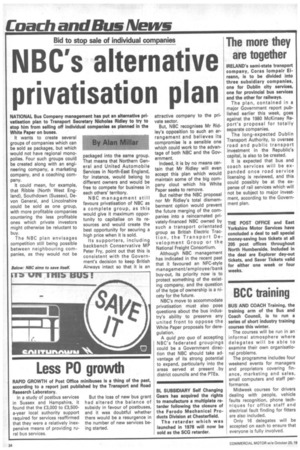Bid to stop sale of individual companies
Page 26

If you've noticed an error in this article please click here to report it so we can fix it.
NBC's alternative privatisation plan
NATIONAL Bus Company management has put an alternative privatisation plan to Transport Secretary Nicholas Ridley to try to stop him from selling off individual companies as planned in the White Paper on buses.
It wants to create several groups of companies which can be sold as packages, but which would not have regional monopolies. Four such groups could be created along with an engineering company, a marketing company, and a coaching company.
It could mean, for example, that Ribble (North West England), Southdown (Sussex), Devon General, and Lincolnshire could be sold as one group, with more profitable companies countering the less profitable ones which private investors might otherwise be reluctant to buy.
The NBC plan envisages competition still being possible between neighbouring companies, as they would not be packaged into the same group. That means that Northern General and United Automobile Services in North-East England, for instance, would belong to different owners and would be free to compete for business in each others' territory.
NBC management still favours privatisation of NBC as a complete group, as this would give it maximum opportunity to capitalise on its resources and would create the best opportunity for securing a high price when it is sold.
Its supporters, including backbench Conservative MP Peter Fry, point out that this is consistent with the Government's decision to keep British Airways intact so that it is an attractive company to the private sector.
But, NBC recognises Mr Ridley's opposition to such an arrangement and believes its compromise is a sensible one which could work to the advantage of both NBC and the Government.
Indeed, it is by no means certain that Mr Ridley will even accept this plan which would maintain some of the big company clout which his White Paper seeks to remove.
But neither the NBC proposal nor Mr Ridley's total dismemberment option would prevent the future merging of the companies into a reincarnated privately-financed NBC owned by such a transport orientated group as British Electric Traction, the Transport Development Group or the National Freight Consortium.
Although NBC management has indicated in the recent past that it favoured an NEC-style management/employee/bank buy-out, its priority now is to protect something of the existing company, and the question of the type of ownership is a nicety for the future.
NBC's move to accommodate privatisation must also pose questions about the bus industry's ability to preserve any united front to oppose the White Paper proposals for deregulation.
A quid pro qua of accepting NBC's federated groupings could be a Government direction that NBC should take advantage of its strong potential to expand, particularly into the areas served at present by district councils and the PTEs.
































































































































































































































